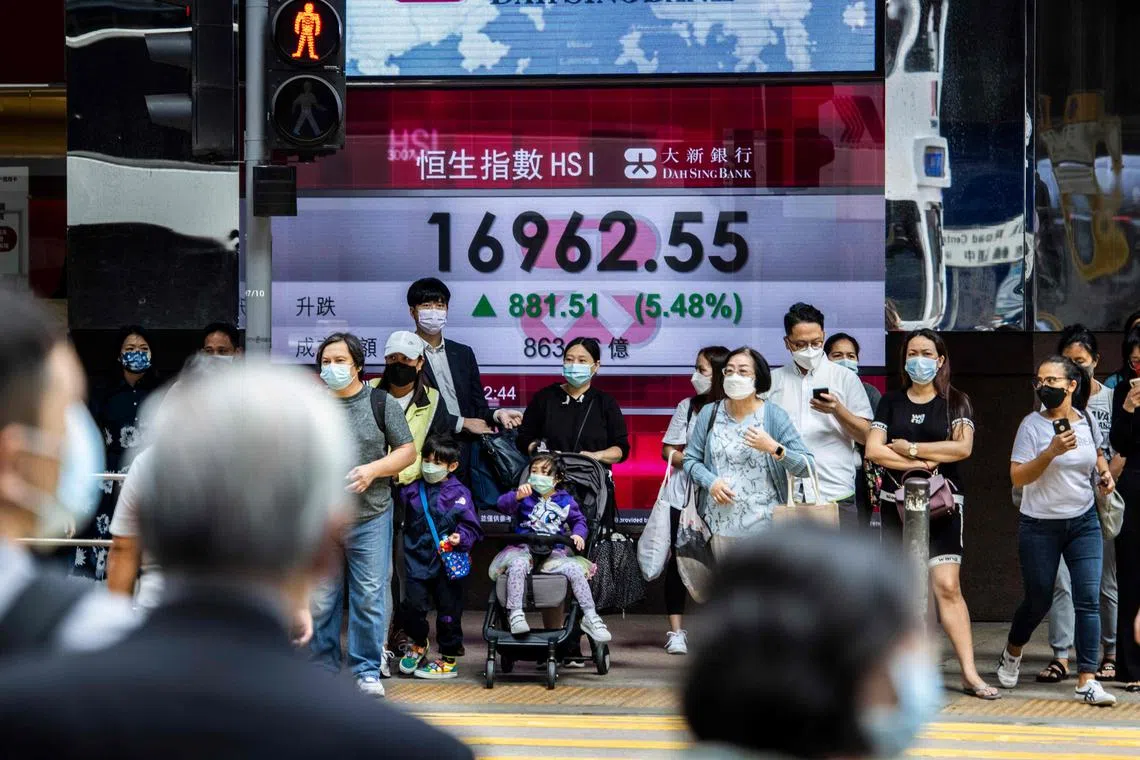Hong Kong, China stocks extend rally on easing of Covid-19 curbs, support for developers
Sign up now: Get insights on Asia's fast-moving developments

The Hang Seng Index in Hong Kong closed 1.7 per cent higher after opening with a 3.89 per cent jump.
PHOTO: AFP
BEIJING - Stocks in China, including Hong Kong, rallied for a second day on Monday, after the announcement of new measures
The Hang Seng Index in Hong Kong closed 1.7 per cent higher on Monday after opening with a 3.89 per cent jump. The benchmark Shanghai Composite Index retreated 0.13 per cent at closing after opening with an additional 0.44 per cent.
China’s biggest property developer, Country Garden, was one of the rally’s biggest gainers. Its share price jumped 45.54 per cent to HK$3.26 when the Hong Kong market closed.
A Bloomberg Intelligence index of developers’ shares surged as much as 18.8 per cent, the highest ever.
The rally comes after Beijing released a slew of measures on Friday aimed at boosting economic growth, which had been dragged down this year by the twin pressures of strict Covid-19 measures and a downtrodden property market.
Beijing had announced that the quarantine period for international travellers will be cut to five days – down from seven – followed by three days of isolation at home.
The newly released 20-point plan to refine China’s Covid-19 measures also stated that the authorities will axe a suspension on flights that bring in Covid-19 cases.
China is the last country to insist on a zero-Covid-19 approach,
A gauge of Chinese stocks listed in the United States soared more than 6 per cent after Beijing’s announcement on the easing of quarantine rules.
The changes to China’s Covid-19 measures on Friday coincided with the release of a 16-point plan to promote the “stable and healthy development” of the troubled property market.
The changes include an extension of existing developer loans, which would give cash-strapped property companies more breathing room. For example, developer loans that are due within the next six months could be extended for another 12 months.
China’s central bank and its banking regulator also asked financial institutions to further lower the mortgage rate and down payment for homes in order to draw in buyers.
Regulators have been clamping down on developers’ ballooning debt since 2020, causing the firms to plunge into a liquidity crisis, and resulting in the downfall of a number of formerly high-flying real estate giants, including Evergrande.
Dr Larry Hu, chief China economist at financial firm Macquarie Group in Hong Kong, called the changes “significant”, particularly the loan extension.
“In the past, policymakers had been reluctant to support developers, maybe due to concerns of moral hazards... mainly relying on cutting mortgage rates to support the property sector,” he said.
But the impact of lower mortgage rates turned out to be much more muted than in previous cycles, due to weak confidence in the troubled property developers, he added.
“It’s still uncertain whether 16 measures are enough, but it’s clear that policymakers now have the courage to take more decisive actions,” Dr Hu said.
Dr Zhang Zhiwei, chief economist at Pinpoint Asset Management in Hong Kong, expects recovery in the world’s second-largest economy to “likely take several quarters, given the weakening external demand and the soft demand in the property market”.
“Nonetheless, a proactive policy stance helps to stabilise market expectation for economic growth in 2023,” he added.
Economists expect China’s economy to grow by up to 4 per cent this year – falling short of its stated target of around 5.5 per cent.
So far, growth in the first nine months has been a tepid 3 per cent. Beijing will release economic data for October on Tuesday.
Dr Zhang said: “These policies indicate the government intends to move towards reopening the economy, though the exact schedule is still not clear at this stage... Nonetheless, this is an important step in the right direction.”



